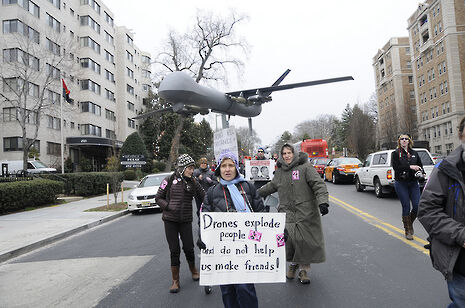Students join debate on drones
A petition has been launched calling on HE institutions to recognise the human cost of drone technologies

A Cambridge student has launched a campaign to encourage British universities to cease investment in companies that produce drones.
Sara Aslam, a Masters student in Modern South Asian studies, has started a petition which calls for higher education institutions to consider the human costs of the use of drones and to divest from drone technologies.
Drones are unmanned aircraft that are controlled from the ground or through a pre-programmed mission. The CIA uses drones to track-down and kill suspected militants. The Obama administration has launched more than 390 drone strikes in Pakistan, Somalia and Yemen in the last five years, eight times as many as were launched during the entire Bush presidency. These strikes have killed more than 2,400 people, at least 273 of whom were reportedly civilians.
“It’s absolutely crazy that these investments exist,” says Aslam, a former management consultant who has taken a year out to study at the University. “How on earth can student-rearing institutions actually invest in technology that has killed innocent students halfway across the world?”.
Aslam first became interested in the issue of drone warfare as an undergraduate when she was president of the National Union of Pakistani Students and Alumni. Among this group, she says, the use of drones is a key issue.
She decided to actively protest against the use of drones last October, following nine-year-old Nabila Rehman’s testimony before US congress as a victim of a drone strike. “There was quite a stir-up about Nabila Rehman…but nothing much came of it.”
On Monday the Centre of South Asian Studies hosted a showing of the documentary ‘Unmanned: America’s Unofficial Drone Wars’, a film about the impact of the Obama Administration’s drone policy on the tribal region of Pakistan. The event was organised by Aslam as a way to start a discourse within the Cambridge community.
“I want to do something that makes a tangible difference,” says Aslam. “The more we can spread the word the better; the more students are affected by the message the better.”
The documentary focuses on the suffering caused by the use of drones, showing interview footage with drone strike survivors.
The not-for-profit film seeks to show that many popular perceptions of drone warfare are unfounded. Co-executive producer of the film Jemima Khan, who attended the screening on Monday, said she hoped the film would “dispel the myths” about drones.
The audience was packed, and many said that they had been strongly affected by the film. Emeritus Professor of Imperial and Naval History Christopher Bayly, who attended the screening, said that his reaction was one of “alarm and sadness”.
Ed Anderson, a student at Darwin College, said that the film was “disturbing, revealing and very upsetting”. He added, “The callous, indiscriminate lawlessness of drone warfare came through very shockingly.”
The event was widely covered by Pakistani media. It has been seen as a hopeful sign of British interest in US drone policy.
Aslam’s launching of a British anti-drone campaign corresponds with a similar student-led campaign in Pakistan. A group of university students have started an initiative to protest against the use of drones in Pakistan and neighboring countries. On Wednesday it coordinated screenings of ‘Unmanned’ at two universities in Pakistan.
Khan hopes that student activism worldwide can have a marked impact on the use of drones: “As people with a conscience we have to oppose them with whatever power we have.”
Being a student, the energy and the passion for the cause is somewhat more aggressive and natural. With the right approach it can have a massive impact.”
Sara Aslam will host another showing of ‘Unmanned’ in partnership with Positive Investment Cambridge next month.
 News / Report suggests Cambridge the hardest place to get a first in the country23 January 2026
News / Report suggests Cambridge the hardest place to get a first in the country23 January 2026 News / Reform candidate retracts claim of being Cambridge alum 26 January 2026
News / Reform candidate retracts claim of being Cambridge alum 26 January 2026 News / Cambridge ranks in the top ten for every subject area in 202623 January 2026
News / Cambridge ranks in the top ten for every subject area in 202623 January 2026 Comment / Cambridge has already become complacent on class23 January 2026
Comment / Cambridge has already become complacent on class23 January 2026 News / Students condemn ‘insidious’ Israel trip23 January 2026
News / Students condemn ‘insidious’ Israel trip23 January 2026









